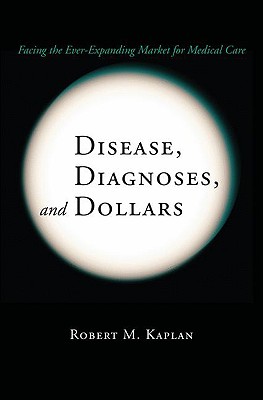

 Copernicus Books
Copernicus Books
Disease, Diagnoses, and Dollars: Facing the Ever-Expanding Market for Medical Care


Key Metrics
- Robert M Kaplan
- Copernicus Books
- Hardcover
- 9780387740447
- 9.48 X 6.52 X 0.81 inches
- 1.05 pounds
- Medical > Health Care Delivery
- English
 Secure Transaction
Secure TransactionBook Description
Disease, Diagnoses, and Dollars is about the costs of health care and their impact on health. The U.S. health care system is the largest sector in the biggest economy, and the US spends significantly more per capita on health care than any other country, yet it ranks last among comparison nations on the major health indicators. Within the U.S., there is evidence that regions that spend more do not have better outcomes, and some evidence suggests that quality of care is lower in the regions that spend more, not less, on health care.
Robert Kaplan takes the controversial position that mass markets have been created for services that may offer little or no benefit to patients. Many of these markets are for preventive medicine, making healthy people a market for expensive pharmaceutical products and tests. These include cancer screening tests and medications to control blood pressure, cholesterol, and glucose. Kaplan forcefully argues that the overuse of medications and tests runs up the costs of health care. As more employers drop health insurance for their employees when costs accelerate, the expanded use of ineffective preventive medicine may have the unintended consequence of increasing the number of uninsured patients, potentially damaging the health of others in the community.
The concluding chapters of Disease, Diagnoses, and Dollars offer suggestions for policy makers and for patients. Methods for systematically evaluating the cost-effectiveness of new guidelines are discussed. The final chapter provides practical suggestions to enable patients to share in decisions about treatments or tests that can have uncertain benefits.
Author Bio
Robert M. Kaplan is a Distinguished Research Professor of Health Policy and Management in the Fielding School. He has served as Chief Science Officer at the US Agency for Health Care Research and Quality (AHRQ) and Associate Director of the National Institutes of Health, where he led the behavioral and social sciences programs.
Before he served in government, he led the UCLA/RAND AHRQ health services training program and the UCLA/RAND CDC Prevention Research Center. He was Chair of the Department of Health Services (now HPM) from 2004 to 2009. From 1997 to 2004 he was Professor and Chair of the Department of Family and Preventive Medicine, at the University of California, San Diego. He is a past President of several organizations, including the American Psychological Association Division of Health Psychology, Section J of the American Association for the Advancement of Science (Pacific), the International Society for Quality of Life Research, the Society for Behavioral Medicine, and the Academy of Behavioral Medicine Research. Kaplan is a former Editor-in-Chief of Health Psychology and of the Annals of Behavioral Medicine.
His 20 books and over 565 articles or chapters have been cited more than 57,000 times. Google Scholar includes him in the list of the most highly cited authors in all areas of science (defined as H-Index > 100). Kaplan was elected to the National Academy of Medicine (formerly the Institute of Medicine) in 2005. In addition to UCLA, he is a faculty member at the Stanford School of Medicine Clinical Excellence Research Center (CERC).
Source: University of California - Fielding of School of Public Health
Videos
No Videos
Community reviews
Write a ReviewNo Community reviews